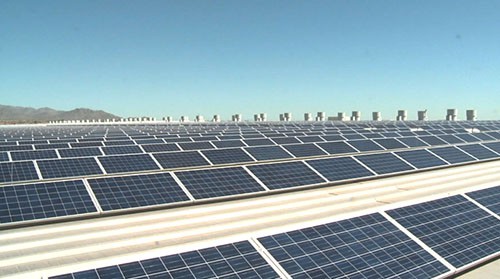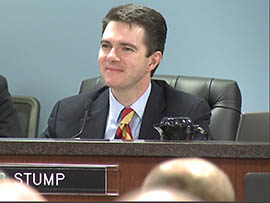Cronkite News has moved to a new home at cronkitenews.azpbs.org. Use this site to search archives from 2011 to May 2015. You can search the new site for current stories.
Corporation Commission begins hearings on future of net metering
PHOENIX – Dru Bacon compared APS’ response to household solar to Eastman Kodak Co.’s inability to recognize the future of digital photography.
Jeff Hodgkinson said groups supporting the utility’s request to charge new solar users a fee for accessing the electric grid are engaging in smear campaigns against those opposed to it.
Russell Pearce, the former state senator, said it’s unfair for ratepayers to subsidize solar users, while Steve Pierce, a current state senator, said solar users should pay for the grid just like other customers.
As the Arizona Corporation Commission began hearings Wednesday on net metering, scores of people signed up to share their thoughts. Most speakers opposed the fee APS is seeking, while the scene outside included a DJ, band and dozens of people holding signs objecting to the proposal.
At present, an Arizona homeowner with a solar system feeds excess electricity into a utility’s grid and receives a credit against his or her bill. Arizona is among several states looking into altering their rules for the practice, known as net metering.
Solar users, who currently don’t pay for access to the grid, and solar industry groups contend that the benefits of the systems offset the cost to utilities of establishing and maintaining the electric grid.
While solar advocates want to maintain the status quo, APS has made several different proposals to the Corporation Commission, including a monthly charge of between $50 and $100.
In October, the Arizona Residential Utility Consumer Office, the state’s advocate for residential ratepayers, recommended a monthly charge for solar users that would equate to about $7 a month for the average solar system.
The APS and RUCO proposals would apply only to new solar installations.
Groups for and against the change launched advertising and public relations campaigns in recent months, to the extent that Commissioner Bob Burns requested that groups disclose their spending.
Earlier this month, APS disclosed that its parent company, Pinnacle West, spent about $3.7 million on its net-metering public relations campaign, according to a Corporation Commission docket filing.
The Alliance for Solar Choice, one of several solar advocacy groups to file with the Corporation Commission, reported spending more than $330,000 on its effort.
The five-member commission was expected to vote at the conclusion of the two-day hearing.
With more than 100 people registered to speak, the commission limited comments to three minutes per person.
Dru Bacon, a solar user from Goodyear and retired chemical engineer at Kodak, said APS should look at the experience of his former employer, which recently emerged from bankruptcy after failing to respond to a disruptive technology.
“I would ask APS to look at their business model and find a way to remain relevant,” he said.
Charles Miller, a retiree living in an age-restricted community in Goodyear, said Social Security’s cost-of-living-adjustment was 1.4 percent this year while the average APS rate increase was 4.5 percent.
“You can only go on with this for so long,” he said.
Jeff Hodgkinson, a resident of Mesa, said solar users allow utility companies to generate less power, which reduces fossil fuel use and capital costs. He questioned how utility companies can lose money when they control the transmission of power.
Barry Goldwater Jr., chairman of Tell Utilities Solar won’t be Killed, one of the main groups opposing APS’ proposal, said the utility is committed to solar as long as it can pass the costs to ratepayers and earn a profit.
With the solar industry just becoming profitable, now isn’t the time to change net-metering policy, he said.
“I’m suggesting to you to not to pull out the rug from under this industry,” Goldwater said.
Russell Pearce, a former Republican state senator from Mesa, said ratepayers shouldn’t subsidize solar users.
“Free markets are an important part of our country,” he said. “To manipulate the free market is wrong.”
Steve Pierce, a Republican state senator who said he represented himself as a citizen, rancher and APS customer, said a solar user should pay for the grid just like any person should pay to rent a piece of machinery.
“Someone else paid for that to come out to my house – 25 miles from Prescott – and I would expect to pay somebody for the use of that if I ever to put power back into it,” he said.









